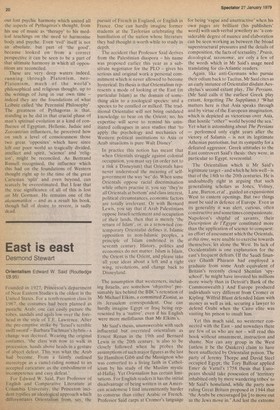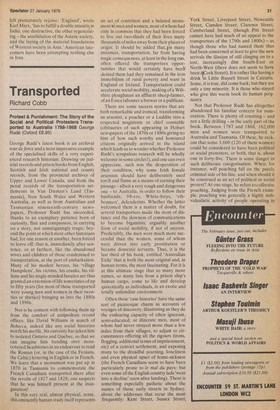East is east
Desmond Stewart
Orientalism Edward W. Said (Routledge £8.95)
Founded in 1927, Princeton's department of Near Eastern Studies is the oldest in the United States. For a tenth-reunion class in 1967. the costumes had been planned as pastiche Arab: one can easily picture the robes, sandals and agals low over the forehead in the style of T.E. Lawrence. After the pre-emptive strike by 'Israel's terrible swift sword' –Barbara Tuchman's hybris– a change was decreed. Wearing the original costumes, 'the class was now to walk in procession, hands above heads in a gesture of abject defeat. This was what the Arab had become. From a faintly outlined stereotype as a camel-riding nomad to an accepted caricature as the embodiment of incompetence and easy defeat.'
For Edward W. Said. Parr Professor of English and Comparative Literature at Columbia University, the Princeton incident typifies an ideological approach which differentiates Orientalism from, say, the pursuit of French in England, or English in France. One can hardly imagine former students at the Taylorian celebrating the humiliation of the nation whose literature they had thought it worth while to study in depth.
The accident that Professor Said derives from the Palestinian diaspora – his name was proposed earlier this year as a substitute negotiator for the PLO – gives his serious and original work a personal commitment which is never allowed to become hysterical. Its thesis is that Orientalism represents a mode of looking at the East (in particular Islam) as the domain of something akin to a zoological species: and a species to be coralled or milked. The traditional Orientalist will not bring outdated knowledge to bear on the Orient; no, his expertise will serve to remind his uninitiated colleagues in area studies that `to apply the psychology and mechanics of Western political institutions to Asia or Arab situations is pure Walt Disney'.
In practice this notion has meant that when Orientals struggle against colonial occupation, you must say (in order not to a risk a Disneyism) that Orientals have never understood the meaning of selfgovernment the way 'we' do. When some Orientals oppose racial discrimination while others practise it, you say 'they're all Orientals at bottom' and class interest, political circumstances, economic factors are totally irrelevant. Or with Bernard Lewis, you say that if Arab Palestinians oppose Israeli settlement and occupation of their lands, then that is merely 'the return of Islam', or, as a renowned contemporary Orientalist defines it, Islamic opposition to non-Islamic peoples, a principle of Islam enshrined in the seventh century. History, politics and economics do not matter. Islam is Islam, the Orient is the Orient, and please take all your ideas about a left and a right wing, revolutions, and change back to Disneyland.
The assumption that westerners, including Israelis, are somehow 'objective' presumably lies behind the BBC's retention of Mr Michael Elkins, a committed Zionist, as its Jerusalem correspondent. One can hardly imagine Egypt or Iraq being represented by a 'native', even if his English were more mellifluous than Mr Elkins's.
Mr Said's thesis, unanswerable with such influential but overrated orientalists as Ernest Renan in the 19th and Bernard Lewis in the 20th century, is also to be closely followed when he probes the assumptions of such major figures as the last Sir Hamilton Gibb and the Massignon who was converted to a living faith in Catholicism by his study of the Muslim mystic al-Hallaj. Yet Orientalism has certain limitations. For English readers it has the initial disadvantage of being written in an American academese I find intermittently harder to construe than either Arabic or French. Professor Said carps at Cromer's language for being 'vague and unattractive' when his own pages are brilliant (his publishers' word) with such verbal jewellery as: 'a considerable degree of nuance and elaboration can be seen working as between the broad superstructural pressures and the details of composition, the facts of textuality.' Praxis, doxological, taxonomic, are only a few of the words which in Mr Said's usage need translating for cis-Atlantic readers.
Again, like anti-Germans who pursue their odium back to Tacitus, Mr Said cites as an early instance of Orientalist disdain Aeschylus's second extant play, The Persians. (Mr Said calls it the earliest Greek play extant, forgetting The Suppliants.) 'What matters here is that Asia speaks through and by virtue of the European imagination, which is depicted as victorious over Asia, that hostile "other" world beyond the sea.' Yet what is astonishing about The Persians — performed only eight years after the victory of Salamis – is not its legitimate Athenian patriotism, but its sympathy for a defeated aggressor. Greek attitudes to the East controvert Said's thesis: they were, in particular to Egypt, reverential.
The Orientalism which i5 Mr Said's legitimate target –and which he hits well that of the 18th to the 20th centuries. He is undoubtedly right in arguing that such generalising scholars as Jones, Volney, Lane, Burton, et al guided an expansionist West to eastern openings. But two things ,must be said in defence of Europe. Even in its generality it was alert, curious, often constructive and sometimes compassionate. Napoleon's shipful of savants, their Description de ?Egypte constituted more than the application of science to conquest: an effort of assessment which the Orientals, at this time, were unable to exercise towards themselves, let alone the West. Its lack of Occidentalists is one explanation for the east's frequent defeats. (If the Saudi financier Ghaith Pharaon had employed a graduate from some Arab equivalent of Britain's recently closed Shemlan 'spyschool', he might have invested his millions more wisely than in Detroit's Bank of the Commonwealth.) And Europe produced individuals very different from Cromer or Kipling. Wilfrid Blunt defended Islam with money as well as ink, securing a lawyer to defend Orabi when the Cairo elite was visiting his prison to insult him.
Yet this much said, no westerner connected with the East – and nowadays there are few of us who are not – will read this book without amazement, instruction and shame. Nor can any group in the West (unless it be the Quakers) claim to have been unaffected by Orientalist poison. The party of Jeremy Thorpe and David Steel occupied Egypt; the Tory Balfour applied Emer de Vattel's 1758 thesis that Europeans should take possession of `territory inhabited only by mere wandering tribes' to Mr Said's homeland, while the party now ruling Great Britain proposed in 1944 that 'the Arabs be encouraged [sic] to move out as the Jews move in.' And lest the extreme left prematurely rejoice: 'England', wrote Karl Marx, 'has to fulfill a double missidnrin India: one destructive, the other regenerating — the annihilation of the Asiatic society, and the laying of the material foundations of Western society in Asia.' American latecomers have been attempting nothing else in Iran.







































 Previous page
Previous page